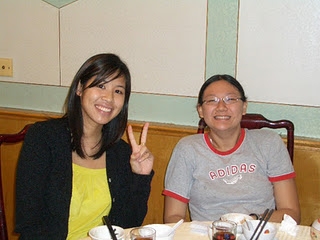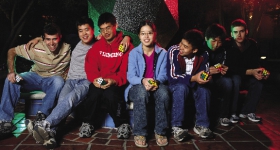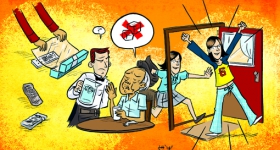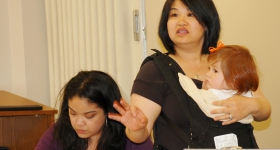The author's mom (far right) in front of their family store in Tucson, AZ.
This post was originally published at the Asian Communities for Reproductive Justice blog.
Growing up, I felt like an outsider. When holidays like Chinese New Year
came around, I would panic. My Taiwanese friends would talk excitedly
about how they would spend their New Year money and compare their plans
for the holiday. As for me, I had nothing to say. Instead I would go
home, wishing that my parents were hiding their special knowledge of how
to be Chinese and that this was the year they were finally going to teach me. That never happened.
My parents don’t even know when Lunar New Year is. Their annual reminder
is not the lunar calendar but when the ads for the San Francisco
Chinese New Year parade hit the local television. And without fail, when
they see the first ad pop on television, their reaction is utter
surprise, "Hmmm, it’s Chinese New Year again?"
As a child, celebrating Chinese New Year seemed like tangible ways to be authentically Chinese. Like a checklist, if I was able to acquire
enough items, I would finally gain membership in a special club. From my
perspective, being ABC (American Born Chinese) was just too amorphous. I
didn’t belong anywhere.
My parents probably felt the same way, too. My mom was born in
California but grew up in Tucson, in a neighborhood of Yaqui native
people. My father was born in China but was brought to San Francisco by
my grandfather, just like his father did before him. My mother was
caught between the brown/white divide, a "Chinese Arizonian." My father
was what I like to call "Chinatown riff-raff" who chilled at the YMCA,
played baseball, and ate brown gravy over rice at the corner diner.
Both of them learned that it was dangerous to be Chinese. They grew up
when immigration from China was restricted to a little over a hundred
people per year. The Cold War and anti-Communism was in full swing.
Japanese Americans had just been interned and Asians were the foreign
threat.
Our stability in the US was fragile. My family was made up entirely of
Paper Sons and Paper Daughters -- starting right after the 1907 San
Francisco fire, which burned all the Chinese immigration records, my
family took on false identities so they could immigrate and work in the
US. My grandparents were interrogated at Angel Island. Eventually, my
strong family was allowed to 'confess' their true immigration status in
the late 1960s but decades of secrecy and fear no doubt took a toll.
Thus, English became the most important subject in my home. We avoided
buying Toyotas and Hondas because they were 'too Asian.' Celebrating
holidays like Chinese New Year was something that we had to give up
along the way.
So my parents were quite surprised when I decided to go to China to visit our ancestral home through the In Search of Roots
program. After learning how not to be 'too Chinese,' going to China was
frightening -- and it felt wrong. I felt like I was going to explode from
anxiety on the plane.

The author with her Chinese Costa Rican roommate, Lily
It ended up being one of the most healing experiences I’ve ever had -- and
not because I found a home in China but because I found a community of
Chinese migrants around the world, the Chinese diaspora. I finally found
my home.
I went back to Taishan, my hometown, where I learned that almost every
country has at least one Taishan migrant who lived or is living there.
In fact, one person observed that every family in that area probably has
at least one relative living abroad. I also discovered the Chinese
language to be incredibly inclusive and found that I could state my
identity as a Chinese American or member of the Chinese diaspora in
words that everybody understood.
As a result, I decided to go back and lived there for nearly two years. I
developed friendships with other young people from the Chinese diaspora
who were from Germany, Costa Rica, Panama, Cuba, Canada and Peru.
Living in China didn't come naturally me and the complexities of being
'back' in China was something I could discuss with comfort at length
with my new community.
This year I will be celebrating Chinese New Year with friends. Some are
looking to form a queer-friendly lion dancing team and others are
planning to watch the football playoffs while making dumplings.
Together, all of us will bring our histories together -- which are so
different and varied -- as members of the Chinese diaspora.









Comments